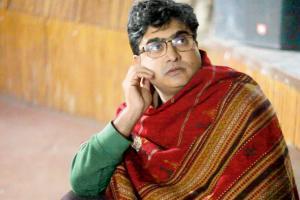Ahead of the staging of his play on the troubled state, which was stalled from being performed in Jaipur, Abhishek Majumdar on why threats to life can't dampen the audacity of theatre

Abhishek Majumdar
Eidgah ke Jinnat opened to a standing ovation in Jaipur in late February, while its next show had to be cancelled. What do you make of such diverse reactions to the play?
ADVERTISEMENT
The people who opposed the play were part of a fringe right-wing Hindutva group in Jaipur. There were only four people who left the hall in the interval and later were instrumental in stopping the play, and all of them were part of this organisation. I think it is important for us as a society to understand that the legitimisation of lynching and mob violence in the name of Hindutva and nationalism has created several [fringe] organisations that are funded by major right-wing organisations. And it is their job to stay in the news. These are neither spontaneous nor ideological oppositions, but organised crimes. I am sure some people will feel differently about a piece of theatre that presents multiple perspectives on a particular idea, but the cancellation had nothing to do with that.
You wrote the play in 2012. How do you view it in the current socio-political context?
Most people still know almost nothing about Kashmir. It has become a symbol of our collective chauvinism. No wonder we want it to be integral to India but we beat up Kashmiris in towns and cities after Pulwama. Inside Kashmir, the independence movement has only grown. Post the death of Burhan Wani, use of pellet guns and particularly, the disaster that the PDP and BJP have been over the last five years, the valley is on a boil. I would have loved it if the play were to become irrelevant one day. Unfortunately, governments on both sides of the border are making sure that it doesn't.

The play, A Bhasha Centre production for Jawahar Kala Kendra, is told through the story of two orphaned siblings
You have termed the kind of research you undertake for a new script a mini MPhil. What is the role of theatre and a playwright in society?
The role of the arts is to save society from the tyranny of culture — from the empty dead habit of celebrating whatever is given to us in codes by society without questioning and celebrating that which we blindly propagate based on the illusion of a supremacist identity. I think the role of the playwright is to make entertainment self-respecting.
When fulfilling that role comes at a cost that could vary from being watched to receiving death threats, does the thought of taking it easy ever cross your mind?
No. I am here to do my job. I am very proud of being a theatre maker. The theatre and its history is full of my heroes who stood for the spirit of questioning in the most difficult times under different regimes and structures of power. I am delighted to be a small part of this extraordinary form; to be part of this generation in India; to be making this play with these colleagues, for this audience, here, right now. This is the audacity of theatre. To be present, over and over again. I am not here to take it easy. I am here to be present with all the contradictions of my time.

What are you working on at the moment, and where has its research taken you?
I am working on a play called Baatin, which is about the Quran. It explores three fundamental questions: Who is a Muslim? What is Islam? And who has authority in Islam? Today, many believe that Islam is about belief, forgetting that it is a deeply argumentative and philosophically diverse system of knowledge and thought.
The journey has taken me to Al Azhar in Cairo, to New York Public Library's archives, to discussions with various Islamic scholars. The reading and the interviews around this project over the last two years have been among the most compelling experiences of my life. I must add that one of my granduncles, Mohini Mohan Majumdar, was an Islamic scholar who wrote a three-part book in Bangla called Mishor Diary (The Diary of Egypt), which was about discussions with Islamic scholars along the Nile. Knowing about this shaped a lot of my own questions and interest in writing this work.
ON May 25 and 26, 4 pm and 8 pm
AT G5A Foundation for Contemporary Culture, Mahalaxmi
log on to bookmyshow.com
Entry Rs 500
Catch up on all the latest Crime, National, International and Hatke news here. Also download the new mid-day Android and iOS apps to get latest updates
 Subscribe today by clicking the link and stay updated with the latest news!" Click here!
Subscribe today by clicking the link and stay updated with the latest news!" Click here!






